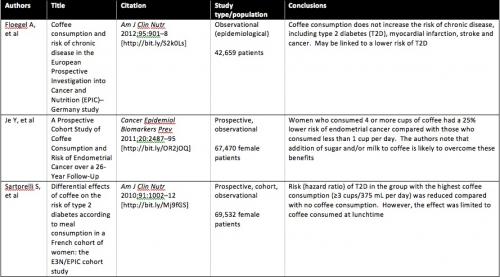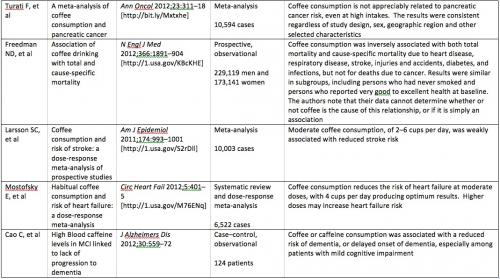By Adam Smith
Science and communications officer, ANH-Intl
Ever been confused over coffee? Is it bad for you, to be avoided at all costs? Or is it a health drink, packed with antioxidants, that can reduce the risk of chronic disease?
Either way, it tastes great
Writing this article, I am comforted by the large take-out cup of steaming, strong, unsweetened black coffee lurking just north of my keyboard. After all, according to a new book, “Coffee is high in antioxidants and there’s hardly any evidence that it’s harmful”. Yippee! That’s what I like to hear. An extra shot in my next vente Americano please, barista!
But hang on. The same author looks like he’s got a downer on locally produced food and drinking plenty of water, so maybe he’s not the best source of information. What about this book instead? “Coffee is highly addictive, offers no nutritional value, and has not been proven safe...women should avoid coffee...discover how eliminating coffee from your diet can not only improve your life, but quite possibly save it.” Oh dear. Hold that extra shot for a minute, will you? Actually, because both of those books are by the same author, she could well be making a career out of bashing coffee. Before I end up completely confused and losing my temper like Ziltoid the Omniscient, I’d better check what the health bods are saying.

Ziltoid with his ever-present cup of coffee. And a bad temper.
Make your mind up!
Let’s start with the mainstream view. The National Health Service (NHS) in the UK sits on the fence, telling me I should limit caffeine during pregnancy (tricky), but otherwise giving coffee the green light in moderation. Also picking splinters out of its backside is the American Heart Association, while the American Pregnancy Association’s advice mirrors that of the NHS.
What about the natural healthcare side? A member of our team had a discussion on this subject a few years back with one of the leading proponents of green coffee enemas for liver detoxification, particularly among cancer patients. His view was straight forward and to the point : “Coffee’s great – but for goodness sake don’t either roast it or drink it!”.
But, while it’s still easy to find examples of the ‘no coffee is best’ attitude among natural and integrative medicine practitioners, other prominent thinkers in the field are moving in the opposite direction.

Delicious or deadly?
Some recent research
The reason for the confusion is clear: there has been something of a flurry of recent scientific publications touting the health benefits of coffee. We’ve summarised some of the most interesting research in Table 1 below – yes, it’s a coffee table (groan) – to help you decide whether coffee is the thing for you.


An intriguing substance
The above list is not meant to be comprehensive, but it does provide a decent snapshot of emerging high-quality scientific evidence pointing to coffee’s – and caffeine’s – health benefits. This is not to say, of course, that coffee is without its downsides, as a recent review points out. Logically, the bewildering variety of physiological responses to coffee can be attributed to its complex chemical makeup. Coffee includes, in addition to caffeine, polyphenols such as chlorogenic acid and caffeic acid, diterpenes such as kahweol and cafestol, amino acids, carbohydrates, potassium and other minerals, among many more. Despite all the research that has been performed so far on coffee’s chemistry and health benefits, there is clearly much left to learn.
A personal story
As with virtually everything in life, the individual response to coffee and/or caffeine can vary tremendously: some people can drink gallons of the stuff without any noticeable ill effects, while others are left jittery, shaking and sleepless after a single cup. Much of this may be due to genetic defects, or single-nucleotide polymorphisms (SNPs, pronounced ‘snips’), in the CYP1A2 gene within the liver’s all-important Phase 1 (cytochrome P450 enzyme) detoxification system.
As a coffee lover myself, and one who never touches instant coffee, I find that negative effects build up over time if I drink it every day: these include irritability, itchy eyes, cracked cuticles, dry skin, localised skin rash, grogginess in the morning and difficulty concentrating. The magnitude of the effects clearly changes according to the time of day when I drink coffee, and if I take it with a meal. And if I drink coffee for too many days in a row, stopping suddenly leads to withdrawal symptoms: headache, mood swings and muscle fatigue the most prominent.
So if you love your coffee and don’t want to give it up completely – and with good evidence of its health benefits, why should you? – here’s some tips to help you enjoy your favourite drink while minimising any problems.
- Drink organic coffee wherever possible, either by brewing your own or seeking out independent cafes that sell the organic stuff
- Reduce the amount of caffeine you ingest on a daily basis, either by replacing a cup or two of caffeinated coffee with decaf or tea, ideally green or white. If you use decaf coffee, go for varieties that have undergone the Swiss water process
- Another caffeine-limiting option is to ask for a ‘half-caf’ coffee, which involves half caffeinated coffee and half decaf per cup. Many coffee bars will do this for you, even if it’s not on the menu
- Don’t drink coffee every day! It gives your bodily detoxification processes time to clear out any problematic coffee breakdown products, and prevents you from becoming physically addicted to coffee and suffering withdrawal effects. Keep a close eye on what your body is telling you, and if you notice any potential ill effects like those I mentioned earlier, it might be time to cut down, at least for a while
- If you start the day with a coffee, try delaying it until later in the day
- Taking coffee with meals serves to buffer its stimulatory effects, and can make the caffeine ‘kick’ far more manageable
- The healthiest form of coffee is black and unsweetened
- Go for fairly traded coffee wherever possible, so that you know the people who grew the coffee in the first place got a decent deal
And a take-home message
But ultimately, the take-home message is this: Something that delivers health benefits will, for some people and at some dosage range, have a detrimental effect. This is what our executive and scientific director, Rob Verkerk PhD, called, in a paper he published in the journal Toxicology, the ‘paradox of overlapping risks and benefits’. He makes the key point that if regulators were to ban all natural substances that pose a health risk to even a nominal sector of the population, the vast majority would no longer be able to experience the benefits associated with those products. Hear that, coffee and alcohol drinkers, and herbal and food supplement users? In other words, the whole principle of using a risk-only based model for regulation, as practiced in the EU, is deeply irrational and flawed if the intention is to create healthy populations.








Comments
your voice counts
11 August 2012 at 8:33 pm
Very nice article. It touches cons and prons all together. Also gives some advice on what kind of coffee might be healthier. I must confess that I love to drink black sweet coffee, with milk, cynamon and almond sirup ;) But maybe I'll go for some minimalistic version as well...
15 August 2012 at 3:55 pm
One man's meat is another man's poison. Ingest & observe - listen to your body. If drinking coffee is adversely affecting your state of health (stomach, skin or musculoskeletal system are examples of some parts of the body that can be affected) - then reduce consumption or stop.
Due to its high acid content coffee is probably best drunk in moderation.
Your voice counts
We welcome your comments and are very interested in your point of view, but we ask that you keep them relevant to the article, that they be civil and without commercial links. All comments are moderated prior to being published. We reserve the right to edit or not publish comments that we consider abusive or offensive.
There is extra content here from a third party provider. You will be unable to see this content unless you agree to allow Content Cookies. Cookie Preferences